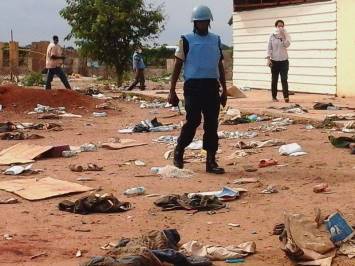South Sudan rebels blast UN humanitarian chief over Bentiu massacre claims
By Tesfa-Alem Tekle
April 26, 2014 (ADDIS ABABA) – The rebel Sudan People’s Liberation Movement/Army (SPLM/A) in Opposition have dismissed reports by a UN official that its forces carried out targeted killings against innocent civilians and prisoners of war after recapturing Unity state capital Bentiu from government forces earlier this month.

“We refute the information that our forces massacred unarmed civilians,” said Gai.
“Only [president] Salva Kiir’s soldiers and SRF (Sudan Revolutionary Front) forces were left in Bentiu town.
“The regime of Salva Kiir and SRF forces [have] more than once has armed civilians to fight along their side,” he added, in reference to the South Sudanese army (SPLA) and Sudanese rebel alliance.
Gai claims that all civilians, traders and displaced persons in Bentiu had been evacuated to safe areas and UN camps in the days prior to the rebel offensive.
Earlier this week, the United Nations Mission in South Sudan (UNMISS) said more than 200 were killed and over 400 wounded after rebel forces attacked a mosque in Bentiu where civilians, including women and children, were sheltering.
UNMISS officials allege that rebels aligned with former vice-president Riek Machar entered the mosque and separated people according to their nationality or ethnicity before killing some and taking others to safety.
Sudanese traders, mainly from the troubles Darfur region, were also among those reportedly killed, although Gai denies the allegations.
“The victims were soldiers hiding and firing from and around the mosque,” he said. “Our force commanders vehemently deny any cold-blooded shooting of civilians or armed renegades inside the mosque.”
Gai went on to say the mosque had been used as an army garrison by government forces loyal to Kiir.
Rebels have also refuted accusations they used a local radio station to broadcast hate messages calling for the killing and rape of women loyal to the government.
“This is propaganda by the government of South Sudan, which is desperately trying to draw [the] wrath of international human rights circles against us,” said Gai.
“The broadcasts in question called for surrender of the renegade soldiers, especially militia groups comprised of local people which were loyal to the government,” he added.
The rebels called on UNMISS to provide evidence implicating their fighters in alleged war crimes, pledging to fully investigate human rights abuses.
The group also called on the AU Commission of Inquiry on South Sudan to hasten its investigation and release its findings publicly.
A delegation from the recently established commission recently arrived in South Sudan for its first field mission as part of regional efforts to end the more than four-month-old conflict, which erupted in the capital, Juba, on 15 December following escalating political tensions between Kiir and Machar, before spreading to other parts of the country.
In a statement issued on 15 April, Lanzer expressed “a certain sense of outrage” at ongoing violence as aid agencies struggle to meet the enormous humanitarian challenges facing the country, saying it will take “compassion, humility and a new way of thinking” to achieve lasting peace.
“There is allegedly a cessation of hostilities (agreement), but the incidents of Bentiu just show that it is not real,” he said. “It is really an outrage for the people … who, if left in peace, will contribute so much to the development of this country,” he added.
The incidents in Bentiu have once again inflamed tribal tensions in the young nation, with the conflict pitting government loyalists of Kiir’s Dinka tribe against rebels of Machar’s Nuer ethnic group.
The fighting between the two rivals has killed tens of thousands and displaced at least one million people.
A new round of talks between the two warring factions is expected to resume on Sunday in the Ethiopian capital, Addis Ababa, under the auspices of East African regional bloc the Intergovernmental Authority On Development (IGAD).
Previous talks between the two sides has failed to halt the conflict on the ground, as has a ceasefire agreement signed on 23 January.
(ST)
